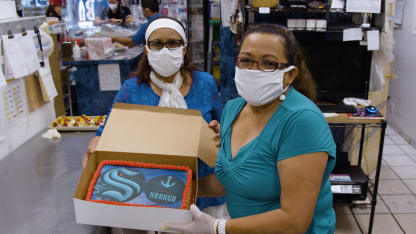There is a difference between cooking and baking that helps explain how two sisters, Ana Castro and Aminta Elgin, started the Salvadoran Bakery and Restaurant in the White Center neighborhood 25 years ago, and how it remains strong today, despite the recent COVID-19 pandemic and the 2008 recession.
"Cooking food is mixing your ingredients, then adding a little bit of everything, then you taste it until you think it tastes good," says Castro. "With baking, you can't miss. If you don't have enough oil or egg, the bread or pastry won't rise. If you don't use salt, it won't bake golden brown."
At the Salvadoran Bakery and Restaurant, be forewarned: you will be ravenous the moment you walk in the door. Castro handles the ordering and welcomes customers ("I am more of a people-person"), while Elgin claims the kitchen and oven as her domain.
"My grandma was an excellent baker," says Elgin. "She taught me, 'the process of the cake or cookies needs to be perfect.' I have always wanted to open a bakery when it was the right time to take a chance."
Ana, upfront in running the business operations and joining community-action coalitions to support White Center, Aminta creates in the kitchen and masters the perfect oven temperatures for each type of bread, cookies, and pastries, just as her grandfather taught her in the back of their grandparents' house in El Salvador. It was their arrangement, the sisters decided when first imagining the dream of a Salvadoran bakery here in Seattle, to bring their native country's culture to the Pacific Northwest.
The pilot light for that dream was lit in childhood and kept flickering through hard times most of us can only imagine. Castro left El Salvador for Seattle in 1981, two years into a 13-year Salvadoran Civil War that was fought between the military-led junta government and Farabundo Martí National Liberation Front from October 1979 through mid-January 1992. Castro helped her sister come to Seattle in 1985. They both worked jobs in other industries until the mid-1990s, when they started the bakery with their parents and husbands as the only other helpers.
Both sisters admit to experiencing natural homesickness, especially in the early years, when leaving a familiar country with family, friends, and a pervasive culture left behind. The bakery, restaurant, and an added pantry store are intended to comfort Salvadorans while encouraging all Seattle-area residents to try the cuisine, baked goods, cooking ingredients and spices.
Beyond that, Elgin says she worried for the Salvadoran youth who arrived in the U.S. with a steep challenge of fitting into American society. Using her share of the business's proceeds, she started soccer leagues for Salvadoran kids and others in White Center. Her love of playing soccer and baseball as a girl ("I am so excited to learn about hockey") inspired her to offer sports as a way for immigrant youth to engage with society. She provided all the funds for uniforms, equipment and the logistics of fields and league planning.
Laughing, Elgin admits there were times when she would sneak out of the kitchen despite her sister saying, "I need you here." Alongside Elgin for our "Kraken Fighting Spirit Presented by Modelo" interview, Castro smiles at the remark, adding, "Yes, I did get upset sometimes."
Castro is active in the community herself. She serves on several White Center boards and action groups to advocate for the White Center community, which is uniquely situated in both the City of Seattle and unincorporated King County. She is committed to "supporting people of color" and volunteered for the Obama presidential campaign. The sisters have long donated to local schools, support the White Center food bank and regularly donate cakes to a local senior community center for parties and "UW Latino graduates." When visited for this story and video, Elgin was surprised with a "Kraken"-decorated cake that by all accounts was delicious.
Elgin says they chose the White Center neighborhood because it had the highest density of Salvadorans, although she notes it was still a relatively small group of people. She estimated that the Salvadoran population in the Seattle area has grown "eight times" in the last 25 years, during which time she has served papusas and other meals at the bakery and restaurant, which features breakfast, lunch, and dinner (currently open for takeout only).
"It hasn't been easy," says Elgin. "Many times I asked myself, 'Are we going to make it?' But I always said to myself, 'If we don't, at least we tried.' I wouldn't have it in my mind that we should have opened a bakery."
The 2008 recession was a significant challenge. Castro says that the banks with which she and Elgin did business from the start closed their accounts, which upset her. The sisters turned to their family for money until the bakery and restaurant could stabilize. They worked through it and, to this day, continue to support family and friends here and in El Salvador.
COVID-19 brought its own challenges, forcing Castro and Elgin to reduce their employee count from nearly 20 workers in early 2020. Castro says she is proud that the bakery supports local neighbors and families, including providing wages for employees, which helps cover their families' food and housing needs. It has been a difficult six-plus months since state and city regulations were instituted for restaurants.
"Our employees were scared we were going to close the bakery," recalls Castro. "For me, even though we are a small business, we feed a lot of people. I was scared, too. From war [in El Salvador], curfew meant curfew; everything shuts down. I realized we were overcoming again. It makes me emotional."
When asked what Seattle-area citizens can do for the Salvadoran Bakery and Restaurant, Castro says, "Come try our food, spend some money to help us keep our employees."



















